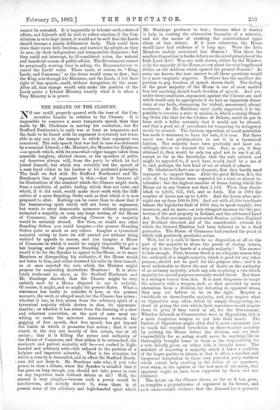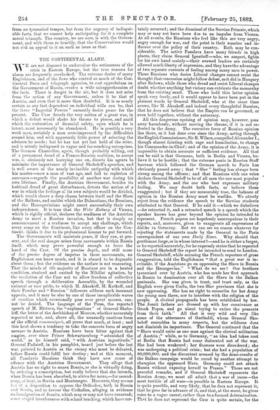THE DEBATE ON THE CLOSURE.
NO one could properly quarrel with the tone of the Con- servative Leader in relation to the Closure. It is impossible to conceive a more temperate speech than that made by Mr. Gladstone in moving his resolution, but Sir Stafford Northcote's in reply was at least as temperate, and the fault to be found with its argument is certainly not trace- able in any way to the temper in which that argument was conceived. The only speech that was bad in tone was delivered by a nominal Liberal,--Mr. Marriott, the Member for Brighton, —a speech which, with its somewhat vulgar images taken from scientific burglary, elicited cheers, as the speeches of politi- cal deserters always will, from the party to which he had joined himself, but which was certainly not the speech of a man loyal either to his leaders or his professed principles. • The fault we find with Sir Stafford Northcote's and Mr. Stanhope's line of argument is this,—that it borrows all its illustrations of the mischief which the Closure might work, from a condition of public feeling which does not exist, and which, if it did exist, would make short work with the diffi- culties of a mere Standing Order such as that which it is now proposed to alter. Nothing can be easier than to show that if the domineering spirit which will not listen to argument, but wants to carry democratic measures without argument, animated a majority, or even any large section, of the House of Commons, the rule allowing Closure by a majority would be certainly abused. But then, so would any other Standing Orders you could imagine,—the present Standing Orders quite as much as any others. Imagine a tyrannical majority raving to have its will carried out without being worried by appeals to reason, and you imagine a House of Commons in which it would be simply impossible to get a fair hearing under the present Standing Orders. What use would it be for the Speaker to appeal to the House, or to name Members as disregarding his authority, if the House would not listen to him, and either drowned his voice in their tumult, or at once rejected the vote which the Minister might propose for suspending disobedient Members ? It is abso- lutely irrelevant to show, as Sir Stafford Northcote and
. Mr. Stanhope showed, that the Closure might be very unfairly used by a House disposed to use it unfairly. Of course, it might, and so might the present Rules. What a statesman has really to consider is how, at the present moment, the need, or alleged need, for the Closure has arisen ; whether it has, in fact, arisen from the arbitrary spirit of a tyrannical majority which desires to shut its opponents' mouths ; or whether it has arisen from the dawning of a slow and reluctant conviction, on the part of men most un- willing to make the minutest concession towards the gagging of free speech, that free speech has got beyond the limits at which it promotes free action ; that it now
stands in the way not merely of free action, but of all action ; that it is killing the power and authority of the House of Commons, and that unless it be retrenched, the moderate and patient majority will be—not curbed in high- handed and arbitrary acts—but reduced to the position of a helpless and impotent minority. That is the situation for which a remedy is demanded, and in effect Sir Stafford North-
- cote did not deny it. Mr. Stanhope asks why, if you take
power to close a debate, when the Speaker is satisfied that it has gone on long enough, you should not take power to vote on any important issue without debate at all ? Well, the answer is very simple,—because such a power would be mischievous, and nobody desires it, since there is at present none of the arbitrary and high-handed spirit which
Mr. Stanhope professes to fear ; because what is wanted is help in curbing the obstructive loquacity of a minority, and not the means of crushing the constitutional oppo- sition of free debate. If it were otherwise, the House would have had evidence of it long ago. Were the Irish Members unduly restrained last Session ? Was there the smallest disposition to burke debate on the novel principles of the Irish Land Act ? Was any wish shown, either by the Minister or by the majority of the House, to cut short the very lengthened debate on the Address which opened the present Session ? As every one knows, the true answer to all these questions would be a most emphatic negative. Nowhere has the smallest dis- position to gag freedom of speech shown itself. The feeling of the great majority of the House is one of even morbid fear lest anything should touch freedom of speech. And yet, under these conditions, arguments against the Closure are used which would only be appropriate if we had an imperious demo- cracy at our heels, clamouring for violent, unreasoned, abrupt measures. As Mr. Rathbone most justly suggested, it is im- possible to conceive a state of opinion in which a strong Stand- ing Order like that for the Closure of Debate, could be put in force with a fuller certainty that it would not be abused, and that a good set of precedents for tempering its stringency would be created. The factious opposition of small minorities has made it necessary to have the rule, it is true. But there never was less predisposition to use it in a tyrannical fashion. The majority have been gradually and most un- willingly driven to demand the rule. But, as yet, if they obtained it., they would be only too glad not to use it at all, except so far as the knowledge that the rule existed, and might be appealed to, if need were, would itself be a use of it, and, perhaps, the best kind of use of which it admits.
Mr. Gladstone's facts are so eloquent, that they hardly need argument to support them. After the great Reform Act, the evils of long Sessions 'were regarded for a time as almost in- tolerable ; but the highest number of hours during which the House sat in any Session was then 1,144. Then they dimin- ished to 1,056, 957, 943, and so forth. But in 1881 the number of hours ran up to 1,400. And the hours after mid- night ran up from 100 to 238. And yet with all this inordinate labour, the legislative fruit of 1881 was, to speak roughly, two measures, and no more,—a very stringent measure for the pro- tection of life and property in Ireland, and the celebrated Land Act. In that enoi mously protracted Session, neither England nor Scotland obtained one of the considerable refornis for which the General Election had been believed to be a final guarantee. The House of Commons had reached the point at which talk positively precludes action.
Well, but it is said, if there be no disposition at all on the part of the majority to abuse the power of closing debate, why put it into the hands of a simple majority ? The answer is clear enough. First, because there is no adequate reason why
the authority of a simple majority which is good for any other purpose, should not be good for this purpose also ; and it is
most undesirable to throw the sort of doubt on the authority of an ordinary majority, which any rule requiring a two-thirds majority for special purposes certainly would throw. But there is a stronger reason than this. It is most dangerous to tempt the minority with a weapon, such as that provided by mere abstention from a division, for defeating an opponent whom they may yet believe to be in the right. Require a two-thirds or three-fourths majority, and you require what an Opposition may often defeat by simply disappearing, in- stead of giving the vote which their conscience would require them to give, if they voted at all, for the Government. Whether Liberals or Conservatives were in Opposition, this is a most dangerous weapon to put into their hands. The leaders of Opposition might often find it most convenient just to baulk the required two-thirds or three-fourths' majority by quitting the House before the division, and yet their responsibility for so acting would never be anything like so thoroughly brought home to them as the responsibility for a vote directly given on either side is brought home. The mischief of requiring a majority which it takes a coalition of the larger parties to obtain, is that it offers a needless and dangerous temptation to those very powerful party instincts which cannot help exulting in the defeat of an opponent, even when, in the opinion of the best men of the party, that opponent ought to have been supported by them, and not hindered.
The debate on the Closure shows, so far as it has gone, so complete a preponderance of argument in its favour, and such unanswerable evidence that the demand for it proceeds
from no tyrannical temper, but from the urgency of indisput- able facts, that we cannot help anticipating for it a complete moral triumph. The country, we are sure, is with the Govern- ment. and with them so heartily, that the Conservatives would not risk an appeal to it on such an issue as that.



































 Previous page
Previous page